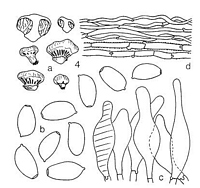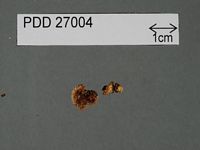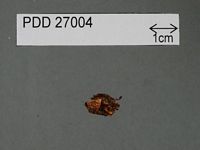|
 Nivatogastrium sulcatum Nivatogastrium sulcatum
BiostatusPresent in region - Indigenous. Endemic
Images (click to enlarge)
Caption: Fig. 4- Nivatogastrium sulcatum Hk.:
a. carpophores (nat. size), b. spores (2000 x). c. chrysocystidia (1000 x).
d. cuticle (500 x). | 
Caption: Dried type specimen
Owner: Herb PDD | 
Caption: Dried type specimen
Owner: Herb PDD |
Article: Horak, E. (1971). Contributions to the knowledge of the Agaricales s.l. (Fungi) of New Zealand. New Zealand Journal of Botany 9(3): 463-493 (http://www.rsnz.org/publish/abstracts.php).
Description: Pileus 10-20 mm diam., hemispherical or convex
when young, becoming pulvinate or flat, margin always strongly incurved and
connected with the stipe, never exposing the gleba: smooth, near or at the margin
grooved by deep radially arranged channels; whitish or pallid argillaceous;
viscid, in dry condition velvety, no veil remnants visible. Gleba consisting
of tortous more or less radially orientated canals, sometimes becoming indistinctly
lamelliform; whitish, later turning brownish: strongly gelatinised. Stipe 7-15
x 4-10 mm, clavate or marginate. attenuated towards the apex, columella always
distinctly developed, edge or marginate base connected with margin of pileus;
concolourous with pileus, viscid, veil remnants absent, basal rhizoids lacking.
Context yellowish turning brown, strongly gelatinised. Smell and taste not distinctive.
Chemical reactions on pileus: KOH—brown.
Spores 9-11 x 4.5-5.5 µm, oval or elliptical,
smooth, yellowish-brownish, membrane thin-walled, with distinct germ pore, bilaterally
symmetrical. Basidia not observed. Chrysocystidia 40-60 x 12-16 µm, fusoid or
lageniform, with thin-walled hyaline membrane, in KOH with yellow plasmatic
pigment. Cuticle a cutis composed of repent, cylindrical, gelatinised hyphae
(2-5 µm diam.), membrane encrusted by brownish pigment, clamp connections present.
Habitat: Among mosses on soil in forests of Nothofagus
spp. New Zealand.
|